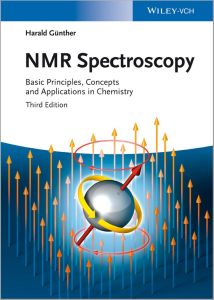
Free download NMR Spectroscopy Basic Principles, Concepts and Applications in Chemistry (3rd edition) written by Harald Günther in pdf.
The present text follows the original concept that tried to fill the reader with enthusiasm for applying NMR methods to solve chemical problems. Since this was not without success, the author kept this policy but has now considerably expanded the scope of this introduction. Furthermore, he took pains to eliminate errors contained in the last edition.
The largest changes are the addition of the new Chapter 12 on NMR of selected heteronuclei, including transition metals. Chapter 14 on partially oriented molecules and solid state NMR has been complemented by a section on residual dipolar couplings, and Chapter 15 that contains—aside from the earlier accounts on NMR of paramagnetic materials and chemically induced nuclear polarization (CIDNP).
A few changes compared to the earlier editions and points where the text differs from conventions used in other NMR books must be mentioned. The low-energy orientation of the nuclear magnetic moment was now changed to be that parallel to the positive z-axis of the Cartesian coordinate system and to the direction of the external field B0, that is with the α-state as the ground state.
To avoid a negative Hamiltonian, the reverse order, which has no consequences on the appearance of the spectrum, was kept in Chapter 5 when treating the analysis of spin systems.
Throughout the text the left-hand-rule is used to describe the action of magnetic fields B on nuclear spins and in the coherence level diagrams the receiver is set at +1.
Contents
- Introduction
Part 1: Basic Principles and Applications
- The Physical Basis of the Nuclear Magnetic Resonance Experiment. Part I
- The Proton Magnetic Resonance Spectra of Organic Molecules – Chemical Shift and Spin–Spin Coupling
- General Experimental Aspects of Nuclear Magnetic Resonance Spectroscopy
- Proton Chemical Shifts and Spin–Spin Coupling Constants as Functions of Structure
- The Analysis of High-Resolution Nuclear Magnetic Resonance Spectra
- The Influence of Molecular Symmetry and Chirality on Proton Magnetic Resonance Spectra
Part II: Advanced Methods and Applications
- The Physical Basis of the Nuclear Magnetic Resonance Experiment. Part II: Pulse and Fourier-Transform NMR
- Two-Dimensional Nuclear Magnetic Resonance Spectroscopy
- More 1D and 2D NMR Experiments: the Nuclear Overhauser Effect – Polarization Transfer – Spin Lock Experiments – 3D NMR
- Carbon-13 Nuclear Magnetic Resonance Spectroscopy
- Selected Heteronuclei
- Influence of Dynamic Effects on Nuclear Magnetic Resonance Spectra
- Nuclear Magnetic Resonance of Partially Oriented Molecules and Solid State NMR
- Selected Topics of Nuclear Magnetic Resonance Spectroscopy
Free download NMR Spectroscopy Basic Principles, Concepts and Applications in Chemistry (3rd edition) written by Harald Günther in pdf from following download links.
Sometime download link(s) is/are not visible on mobile devices, so if you face this issue, kindly do visit this page via laptop/desktop computer.
Password for Download Links: thespectroscopy.com
File Size: 11.6 MB | Pages: 736 | Download Instructions | Disclaimer
You may also like to free download:
- Introduction to Spectroscopy (5th Ed.) written by Donald L. Pavia, Gary M. Lampman, George S. Kriz, and James R. Vyvyan in pdf
- Modern Spectroscopy (4th edition) authored by J. Michael Hollas in pdf
- Spectroscopic Identification of Organic Compounds (8th edition) written by Robert M. Silverstein, Francis X. Webster, David J. Kiemle and David L. Bryce in pdf
Free download hundreds of best-selling chemistry books in pdf from HERE.
P.S: If the download link(s) is/are not working, kindly drop a comment below, so we’ll update the download link for you.
Happy Reading!
